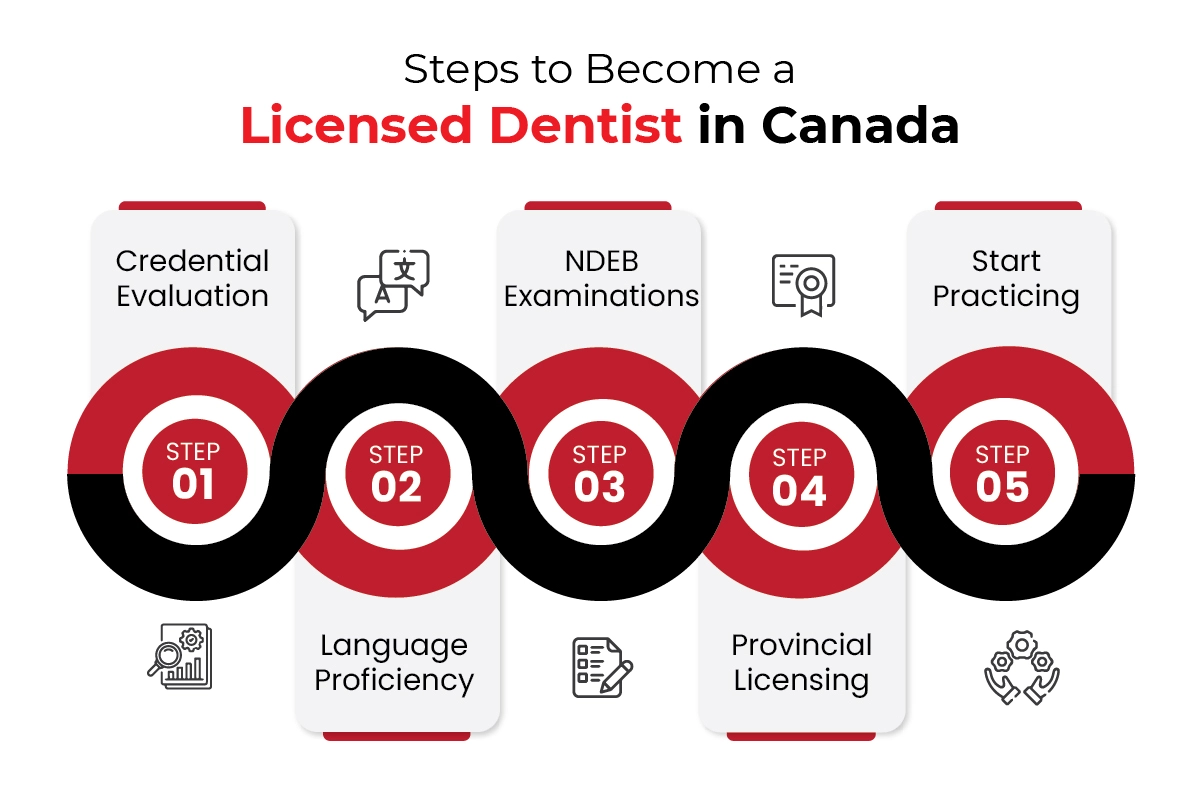Have you ever thought about what it would be like to be a dentist in Canada?
If you’re already a practicing dentist or a student thinking about dentistry, Canada is definitely the perfect place for you. Canada offers a range of opportunities and benefits that make it an attractive destination for dental professionals.
So, grab a cup of coffee, sit back, and let’s explore why Canada might be the ideal place for your dental career.
Table of Content
1Dentists in Canada: A Bright Future Awaits2Understanding the Roles and Responsibilities of Dentists3Job Opportunities for Dentists in Canada4Job Opportunities for Indian Dentists in Canada5Dentist Salary in Canada6How to Immigrate to Canada as a Dentist7How to Become a Licensed Dentist in Canada8Conclusion9Frequently Asked Questions ( FAQ )
Dentists in Canada: A Bright Future Awaits
Canada is indeed a land of opportunities and offers a promising career path for dentists. With a growing population and an increasing importance on oral health, the demand for dental professionals is on the rise.
Now, let’s talk about job prospects. The demand for dentists in Canada is strong and expected to grow in the coming years. Since demand for dentists can vary among provinces, it is worth exploring which areas are in greatest need. For example, rural and underserved communities often have a higher demand for healthcare professionals, including dentists. Moving to one of these areas can increase your chances of finding a job quickly and may come with additional incentives, such as relocation bonuses or student loan forgiveness programs.
Understanding the Roles and Responsibilities of Dentists
Dentists play a crucial role in maintaining and improving oral health. The following is a complete description of what their role entails:
- Examine Patients’ Oral Health: They are involved in diagnosing diseases, injuries, and cavities before structuring effective treatment plans.
- Conduct Dental Restoration, Extraction, or Replacement of Teeth: Restorations, extractions, and replacement of teeth that are decayed or have been diseases are conducted in this field.
- Conduct Surgeries and Interventions: Carry out oral and periodontal surgery and other therapeutic interventions.
- Provide Preventive Care: Dental cleanings and instruction in proper oral hygiene.
- Dental Appliances: Design bridges; fit dentures; design and fabricate appliances to straighten teeth and jaws.
- Supervise Dental Staff: Supervise dental hygienists, assistants, and other staff.
By understanding the multifaceted role of a dentist in Canada, aspiring dental professionals can better prepare for their careers in this rewarding field.
Job Opportunities for Dentists in Canada
The dental industry in Canada is known for its growing nature and the wide range of job opportunities it provides. Whether you’re a recent graduate or an experienced dentist, you’ll find plenty of options to suit your career goals.
Here are some potential roles:
- General Dentistry: Providing comprehensive dental care to patients of all ages.
- Dental Specialist: Focusing on a specific area of dentistry, such as orthodontics, endodontics, or oral surgery.
- Dental Researcher: Conducting research to advance dental knowledge and practices.
- Dental Educator: Teaching future dentists at universities or dental schools.
- Public Health Dentist: Promoting oral health and preventing dental diseases in communities.
Job Opportunities for Indian Dentists in Canada
Indian dentists possess a strong foundation in dental education and practice. With the right qualifications and credentials, they can successfully build a career in Canada. The process might involve additional examinations and licensing requirements, but the rewards are substantial.
Dentist Salary in Canada
The average dentist salary in Canada lies at approximately $200,000 per year. One must remember that it is an average; in reality, the figures might range from far lower to much higher. Dentists in Canada enjoy competitive salaries that are higher than the national average. All of that will depend on multiple factors, which include:
- Geographical Location: Wages vary significantly from one province to another and from one city to another.
- Experience: A senior dentist has higher wages compared to entry-level dentists.
- Specialization: A dentist who possesses specialized skills often attracts a higher wage.
- Practice Ownership: Generally, dentists who are practice owners have higher earnings.
Did you know? BDS salary in Canada is among the highest in the world! Here are the salaries offered by various provinces:
| Area | Low ($/year) | Median ($/year) | High ($/year) |
| British Columbia | 36,973 | 84,000 | 214,000 |
| Alberta | 32,867 | 120,000 | 270,000 |
| Ontario | 35,320 | 104,000 | 210,000 |
| Quebec | 32,389 | 106,000 | 228,000 |
For more details about salary breakdowns in Canada, just refer to the official Job Bank page of the Government of Canada.
Indian Dentist Salary in Canada
Are you an Indian dentist looking to advance your career in Canada? The process of obtaining Canada PR for dentists is a rewarding pathway, offering a lot of opportunities in a country known for its high standards of healthcare. Indian dentists can easily find a promising career in Canada. There is a demand for qualified dental professionals in Canada, especially in certain regions. Indian dentists need to meet specific licensing requirements and language proficiency standards to practice in Canada. The average dentist salary in Canada, when converted to Indian Rupees, is approximately ₹68,00,000 INR per year.
In conclusion, those Indian dentists having the requisite qualification and the sincerity to work hard can definitely have prosperous occupations in Canada. But of course, there are important steps one should follow and it is always good to try and know as much as possible about it in advance.
How to Immigrate to Canada as a Dentist
Ah, the big question: How do you immigrate to Canada as a dentist?
Luckily, Canada is known for its welcoming immigration policies, especially for skilled professionals like dentists. There are several pathways you can take to achieve Canada PR (Permanent Residency).
One popular option is the Express Entry system, which allows skilled workers to apply for permanent residency based on their qualifications and work experience. Dentists often score high on the Comprehensive Ranking System (CRS) due to their education and professional background, increasing their chances of receiving an invitation to apply. Dentist is also in the category list currently under consideration for category-based selection.
Another option is the Provincial Nominee Program (PNP). Provinces and territories in Canada can nominate candidates for permanent residency based on their specific labor market needs. Many provinces have streams dedicated to healthcare professionals, including dentists.
How to Become a Licensed Dentist in Canada

To practice dentistry in Canada, one must obtain a license from the provincial or territorial regulatory body. The process includes:
- Credential Evaluation: International qualifications must be assessed to ensure they meet Canadian standards.
- Examinations: Dentists must pass the National Dental Examining Board (NDEB) exams, which include a written examination and an Objective Structured Clinical Examination (OSCE).
- Language Proficiency: Proof of proficiency in English or French is required.
- Work Experience: Some provinces may require a period of supervised practice or additional training.
Benefits of Relocating to Canada as a Dentist
Canada welcomes people with open arms and offers several benefits for Dentists who are looking to migrate there. Some of these are explained below:
- Job Opportunities Galore: Skilled and well-educated people find various job opportunities opening up in its diverse and dynamic economy.
- Permanent Resident Status: Dentists can gain Permanent Residency through Canada’s immigration system and can avail themselves of free healthcare, education, and other facilities with legal protection.
- Family-Friendly Policies: Families can follow the primary applicant to Canada because its immigration policies are very supportive.
- Top-Class Education: Internationally recognized universities and world-class education systems provide quality education to families in Canada.
- Free Initial Application Process: Application to immigrate in Canada is free of cost up until selection. Costs are incurred only for the PR visa and other paperwork after approval.
The option of moving to Canada means opening professional opportunities and giving a high quality of life to you and your family as a dentist.
Conclusion
Canada offers a wealth of opportunities for dentists, with a supportive environment for professional growth and a high standard of living. By understanding the steps to become licensed and navigating the immigration process, dentists can build a successful and rewarding career in Canada. Whether you’re looking to move immediately or planning for the future, Canada remains a top destination for dental professionals from around the globe.
Ready to embark on your Canadian dental journey? CanApprove can guide you through the complex immigration process, making your transition seamless. Our Canada immigration expert team is dedicated to helping you achieve your professional goals in Canada. Contact us today for a free consultation.
Frequently Asked Questions:
How to work as a dentist in Canada?
Can I get a job in Canada after BDS?
What are the career opportunities for dentists in Canada?
What are the different job opportunities available for dentists in Canada?
What are the immigration pathways for dentists to Canada?
Dentists can immigrate to Canada through several pathways like:
- Express Entry: This system uses a points-based system to assess candidates for the Federal Skilled Worker Program, Canadian Experience Class, or Federal Skilled Trades Program.
- Provincial Nominee Program (PNP): Provinces may nominate dentists for permanent residence based on local labor market needs.
- Atlantic Immigration Program: For dentists moving to Atlantic Canada, this program offers pathways to permanent residency with employer support.
Each pathway requires meeting specific criteria and obtaining relevant credentials.





